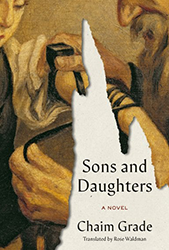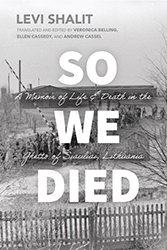In the spring of 1934, poet and artist Celia Dropkin published her only novel, Desires (originally published as Two Feelings). The book was released in sixty-eight installments in The Jewish Daily Forward to an avid Yiddish readership. Recently translated into English by Anita Norich and published by the Yiddish Book Center, the novel follows Shirley, Sam, and Harry, Jews from a small, nameless town outside New York City who together form a love triangle. At the beginning of the book, Shirley reveals to her husband, Sam, that their child, who has recently passed away, was fathered by another man. Sam grows mad with jealousy and hurt, and the couple’s relationship splinters. Throughout the novel, new characters are introduced to the triangle, complicating matters further.
Dropkin was best known for exploring female sexuality and desire, both of which are on full display here. Shirley occupies the center of the novel, and her dueling attractions for Sam and Harry — and later a detective named Klein — occupy her. Sam offers her an intellectual, paternal love that she feels is primary and sustaining; however, he doesn’t offer the same erotic appeal as Harry, and so she breaks off repeatedly over the course of her marriage to be with Harry, even though she knows that doing so will put her home life and reputation in jeopardy. This focus on competing desires was largely unexplored at the time of Dropkin’s writing, and it’s still revealing almost ninety years after the novel’s original publication.
The book’s serialization stands out in this collected version in a way that may hinder one’s reading experience. Presumably to catch readers up, Dropkin added a significant amount of exposition to later installments that reflected themes previously discussed. While these reminders might’ve been helpful for someone who missed an installment or two in 1934, they slow the novel down and make the characters seem more obsessive and self-involved than Dropkin might’ve intended them to be.
The dominant language in the book is Yiddish, with bits of Yiddish-accented English thrown into characters’ speech. Yet outside of a lone rabbi who serves as a voice of wisdom and clarity in the novel, the characters are all secular. To better mix with their Christian neighbors, they “celebrate” Christmas, giving gifts to their acquaintances and business associates. They are still primarily insular, but their desire to fit in and achieve economic success causes them to adopt assimilatory behaviors.
For those interested in Yiddish literature or the culture of Dropkin’s era, Desires is a must-read.
Benjamin Selesnick is a psychotherapist in New Jersey. His writing has appeared in Barely South Review, Lunch Ticket, Tel Aviv Review of Books, and other publications. He holds an MFA in fiction from Rutgers University-Newark.





